As the 2024 election season heats up, Kamala Harris’s policy platform has begun to shape a forward-thinking blueprint for what she calls an “Opportunity Economy” and a “New Way Forward.” With an approach that blends economic pragmatism and social investment, her policy outline aims to strengthen the middle class while addressing the core issues faced by millions of Americans today. Kamala Harris policies zero in on economic stability, healthcare affordability, and supporting American families through accessible resources, tax cuts, and an intentional focus on civil and reproductive rights.
Though some complain about not knowing what her policies are, she speaks of them in every speech, interview, or discussion and has them freely available on her website. Mainstream media in particular ought to be doing more of their own research vs. entertaining spurious claims that she has outlined no 2024 policy proposals. It’s also a quintessential example of the way women are forced to thread a needle in a way that men simply aren’t — I’m old enough to remember when Hillary Clinton was once famously derided for being too wonky and having too many policy proposals. You really can’t win.
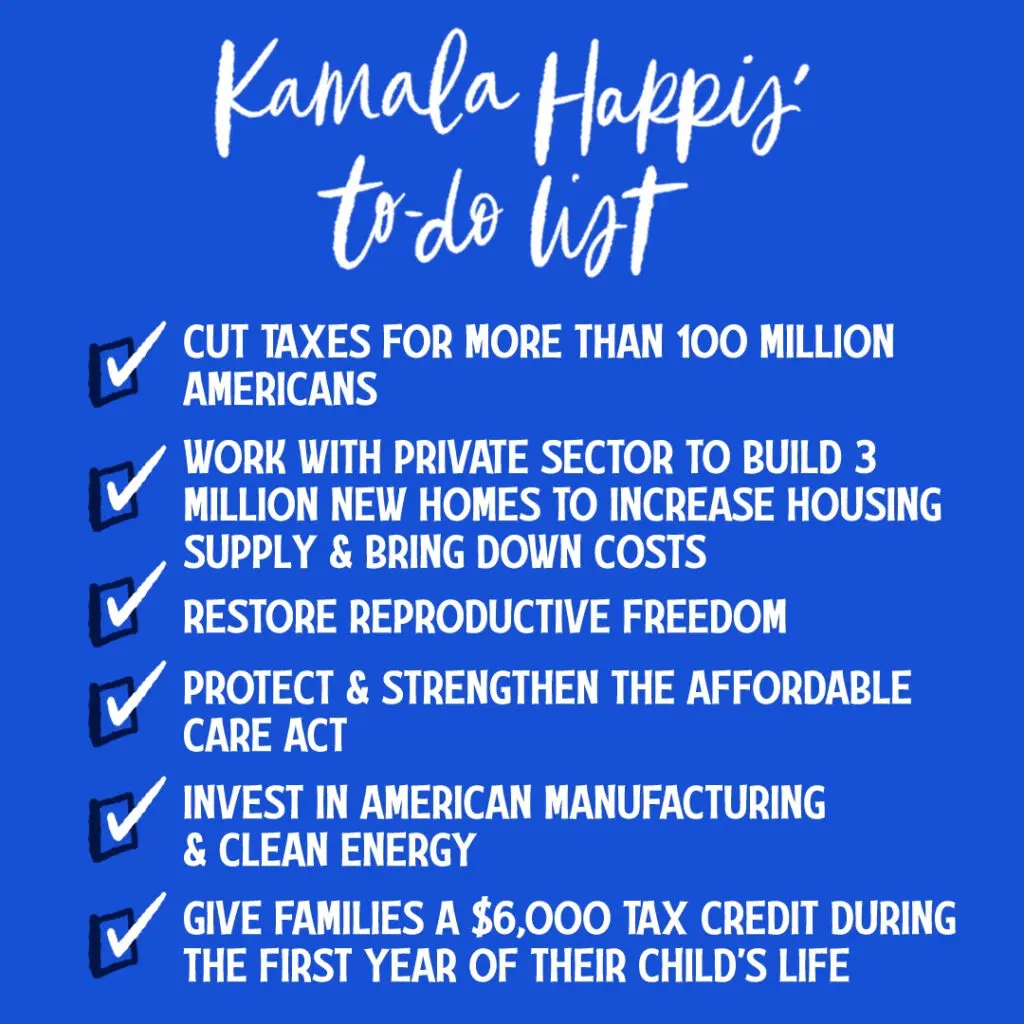
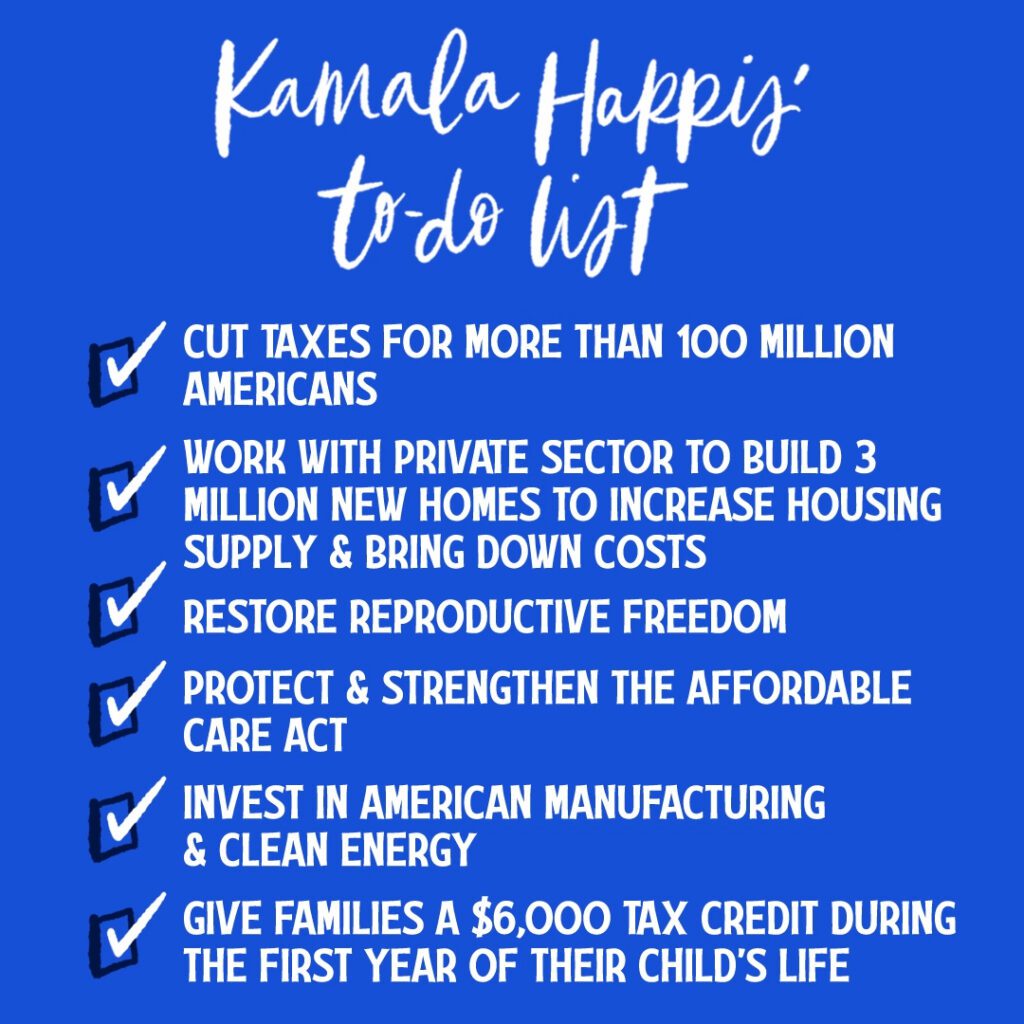
Meanwhile, Harris has a robust economic plan for the middle class as well as fighting staunchly for civil rights, voting rights, reproductive freedom, and democracy in an increasingly multipolar world. Harris’s economic policy combines key strategies designed to lower costs for middle-class families—fighting inflation, tackling price gouging, and expanding Medicare to help the “Sandwich Generation” juggling care for both children and aging parents.
Her policies also encourage entrepreneurship through substantial tax deductions for small businesses and foster a fairer housing market by promoting affordable housing initiatives and cracking down on price fixing. Harris’s vision is one of a sustainable, inclusive future where both family support and economic growth converge to drive lasting change.
Beyond economic reform, her platform emphasizes national security, comprehensive immigration reform, civil rights protections, and an ambitious climate policy. Together, these components create a multifaceted approach intended to protect American values while boosting prosperity. Harris’s policy platform offers voters an actionable vision for a stronger, more equitable America built on accessible opportunities and resilient middle-class foundations.
Kamala Harris economic policy
Kamala Harris has been promoting her economic policy agenda since mid-August — which was a mere 2 weeks since becoming the new top of the ticket suddenly and unexpectedly when Joe Biden decided to withdraw from and race and pass the torch. Her “New Way Forward” for the economy is rooted in a central goal of strengthening the middle class through practical, targeted policies. Aiming to create an “Opportunity Economy,” her platform emphasizes lowering costs for families, capping drug prices, tackling price gouging, and expanding Medicare to better support those juggling elder and child care responsibilities (aka “the Sandwich Generation”).
Harris also advocates for robust support of small businesses, proposing a $50,000 startup expense tax deduction to empower entrepreneurs. Her economic policies encompass tax relief for working families, affordable housing initiatives, and measures to support U.S. innovation and economic security. Here are just some of the workers who would benefit from Kamala Harris’s tax policies:
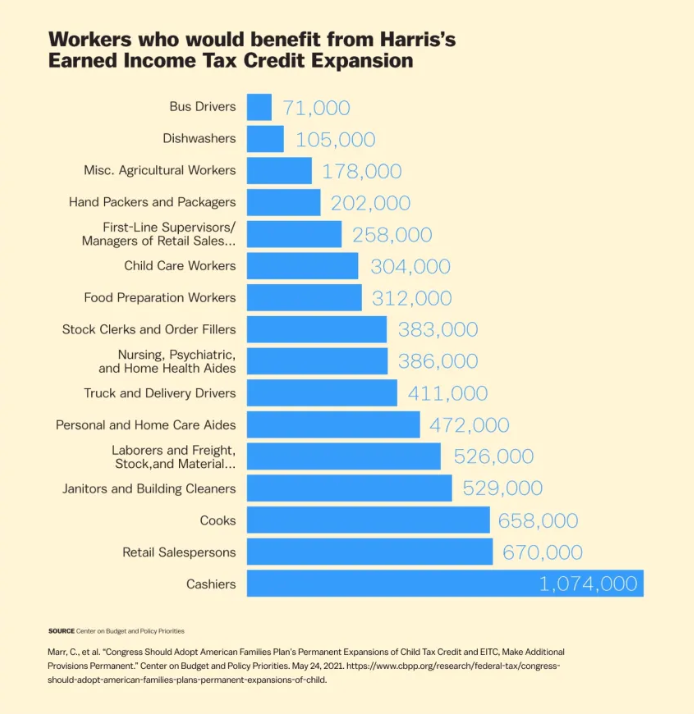
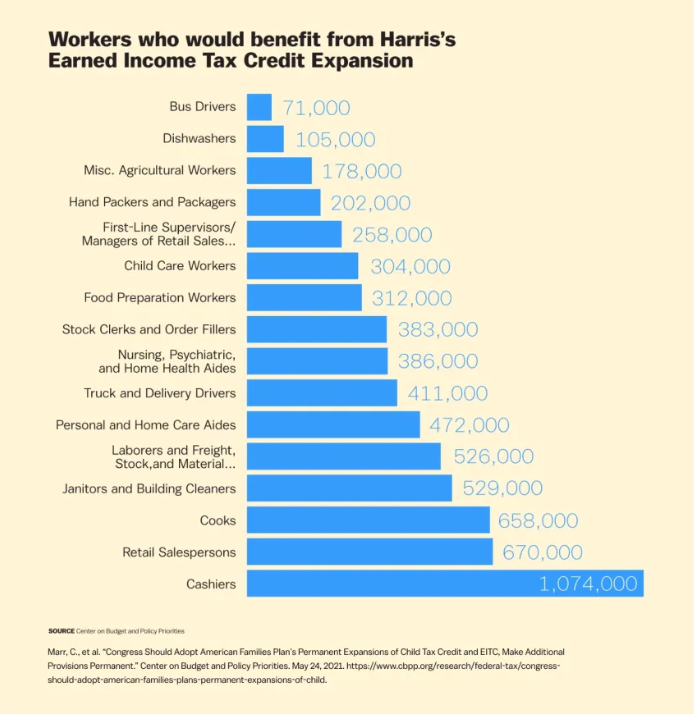
To make housing more affordable, Harris would implement a $25,000 assistance program for first-time homebuyers’ downpayments, expand the housing supply, and offer tax incentives to developers for opening affordable rental units. A Harris administration would also go after abusive corporate landlords and algorithmic price fixing, a scheme which has been dramatically raising rents in many areas of the country.
Social and foreign policy outline
Kamala Harris’s social and foreign policy agenda emphasizes comprehensive reform, security, and civil rights protection. On immigration, Harris supports a balanced approach that combines humane reforms with stronger border security. She advocates for passing the bipartisan border security bill, previously halted under the Trump administration, and taking strong measures to stop fentanyl trafficking. Her policies aim to fortify civil rights protections, particularly for voting and reproductive freedoms, ensuring these core rights remain intact despite mounting challenges.
On the international stage, Harris’s platform includes commitments to bolster national security by supporting NATO, assisting Ukraine in resisting Russian aggression, and countering transnational crime. Her domestic policy also supports measures to prevent gun crime, protect Social Security and Medicare, and provide essential care for veterans, reflecting her broader vision of safety and dignity for Americans. These initiatives tie into her climate goals, which stress long-term sustainability through proactive environmental policy, highlighting Harris’s approach to both social justice and global stability.
Kamala Harris vs. Trump policy
On the economic front, Harris has a lot of heavyweight supporters on her side. A group of 23 Nobel Prize-winning economists — more than half of the currently living recipients of the award — signed a letter calling Harris’s economic policies “vastly superior to the counterproructive economic agenda of Donald Trump.” Another group of 400 economists and former White House policy advisors published an open letter endorsing Harris and her economic plans and warning against the dangers of Trump’s proposals.
Another 40 economists at top schools surveyed by the Financial Times and University of Chicago found that 70% believed Trump‘s proposed tariff policies would be more inflationary, versus only 3% for Harris. Numerous economic and financial professionals have stated that Trump’s enormous planned tariffs would raise prices dramatically. Goldman Sachs released their forecasts of each candidate’s economic plans and their predictions do not look good for Trump:
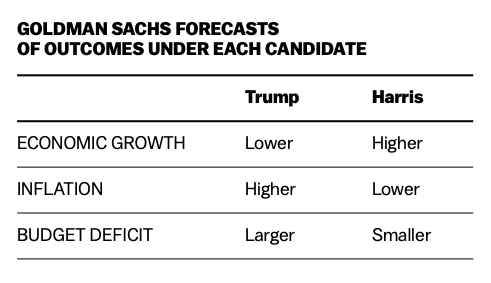
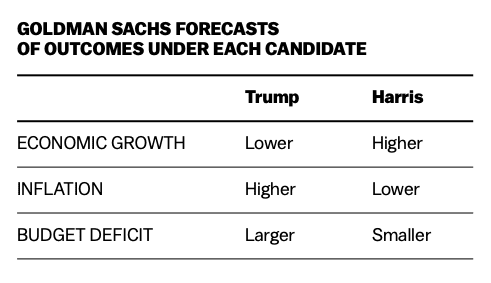
Trump’s broken economic promises
Meanwhile Trump as president gave many confident promises he did not keep:
- He promised a 6% economic growth rate (his best was 2.9%, which is quite average).
- He promised to eliminate the national debt — but instead, increased it by an eye-watering $8T during just one term.
- He said he would revive manufacturing in America — but at the end of his term there had been a net decrease in manufacturing jobs (same thing with the coal industry).
- He pledged to narrow our trade deficit, but it increased significantly.
- He promised to “repeal and replace” the Affordable Care Act (aka Obamacare), but never got it done. He promised repeatedly that the “beautiful” Republican replacement plan was ever 2 weeks around the corner, only to never materialize — and as recently as the Presidential debate with Kamala Harris he admitted he still doesn’t have a plan (only “concepts of a plan“).
- He also repeatedly promised “Infrastructure Week” with a $1T plan to revitalize aging infrastructure — it never happened.
- He predicted the stock market would crash and lead us into the worst depression ever if Biden won. Instead, the very opposite happened — the United States has enjoyed the fastest economic recovery from the pandemic of any developed nation and is by far the leading economy in the world. The Federal Reserve has brought down both inflation and interest rates without triggering a recession. Trump couldn’t have been any more wrong.
Tax Cuts: Harris to the middle class, Trump to billionaires
One place the two candidates differ greatly is tax policy. Both want to cut taxes, but Kamala Harris wants to give tax relief to 100 million Americans in the middle class, while Trump wants to extend and expand his signature 2017 tax cuts to the mega-wealthy. Billionaires like Elon Musk, Peter Thiel, and Jeff Bezos could stand to benefit mightily from a Trump tax policy and “suffer” (squish squish) under a Harris tax code where the ultra rich are asked to pay their fair share.
That’s why it should come as no surprise that Musk is frittering away chump change with his $1 million illegal lottery scheme in a desperate bid to cajole voters so he can cash in; that Bezos suddenly discovered a deep political philosophy about non-endorsement 8 days before an election; and that Thiel is slavering at the reins of power with his paid surrogate JD Vance poised to be just one Big Mac away from the Presidency.
Billionaires want their tax cuts. And they’re certainly willing to throw you and your family under the bus to get them.
Trump would balloon the national debt
Analyses by economists and nonpartisan organizations have projected that Trump’s economic plans would balloon the national debt — by a whipping $8T over the next 10 years. Harris would also grow the debt, but by about $3.5T over the same period — meaning Trump’s plan would blow a hole in the debt more than twice as large as Harris.
Some economists have said they forecast it’s possible for Harris to even reduce the national debt during her tenure in office, while no independent analyses have found that possibility for Trump. If she does manage to reduce the debt, she’ll be the first President since Bill Clinton to do so.
Trump wants to control the Federal Reserve
Since August, Trump has been making statements indicating a desire to gain more control over The Fed — including firing Jerome Powell, not re-appointing him, “weighing in” on interest rates, and otherwise infringing on the essential independence of the Federal Reserve. The Fed needs to make decisions based on the data and not politics — or god help the havoc Trump could wreak, not just on the US economy but on the entire world that is pegged to the US dollar as the primary reserve currency.
We should not destroy the independence of the Fed and allow the president to play political games with the global economic system. It would greatly increase economic uncertainty and be exceedingly painful.
We should instead make the logical choice in this election — to defend our economic system and our democracy — to vote for Kamala Harris for President.
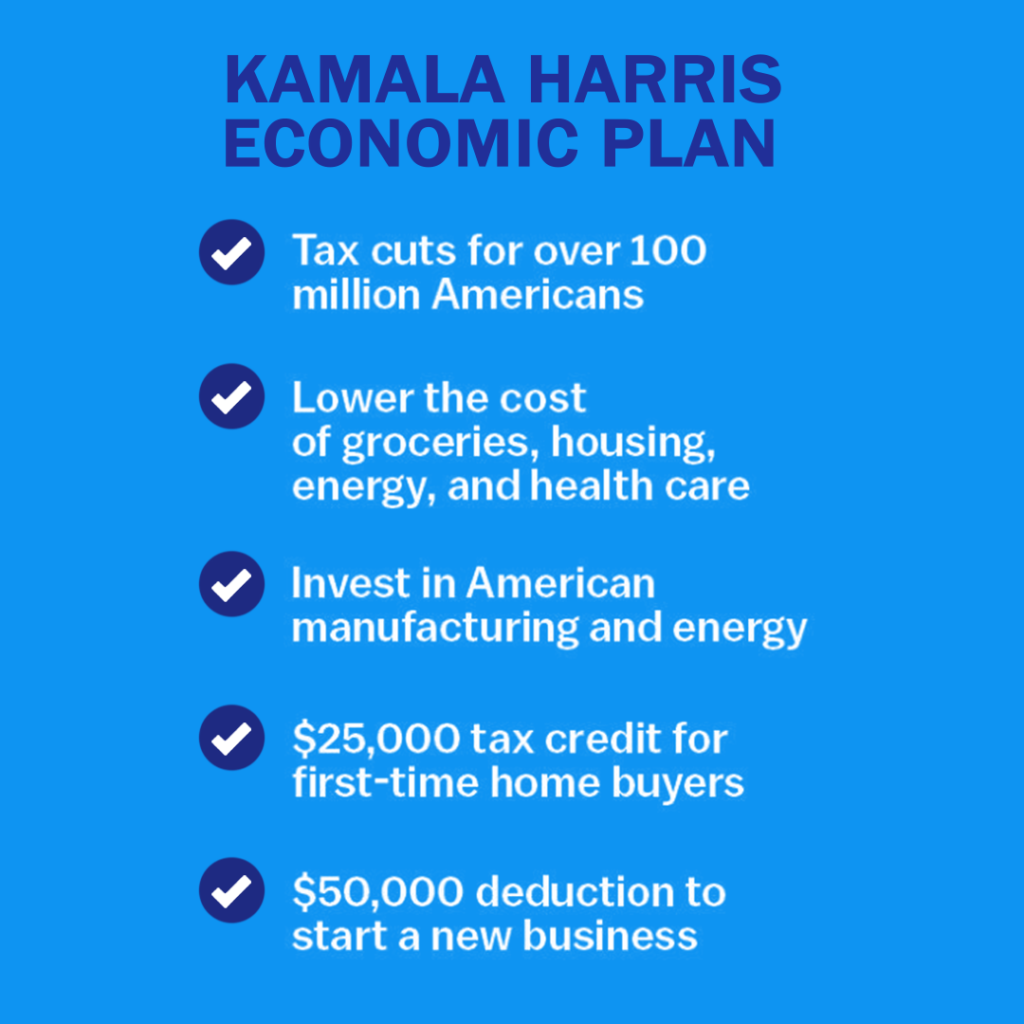
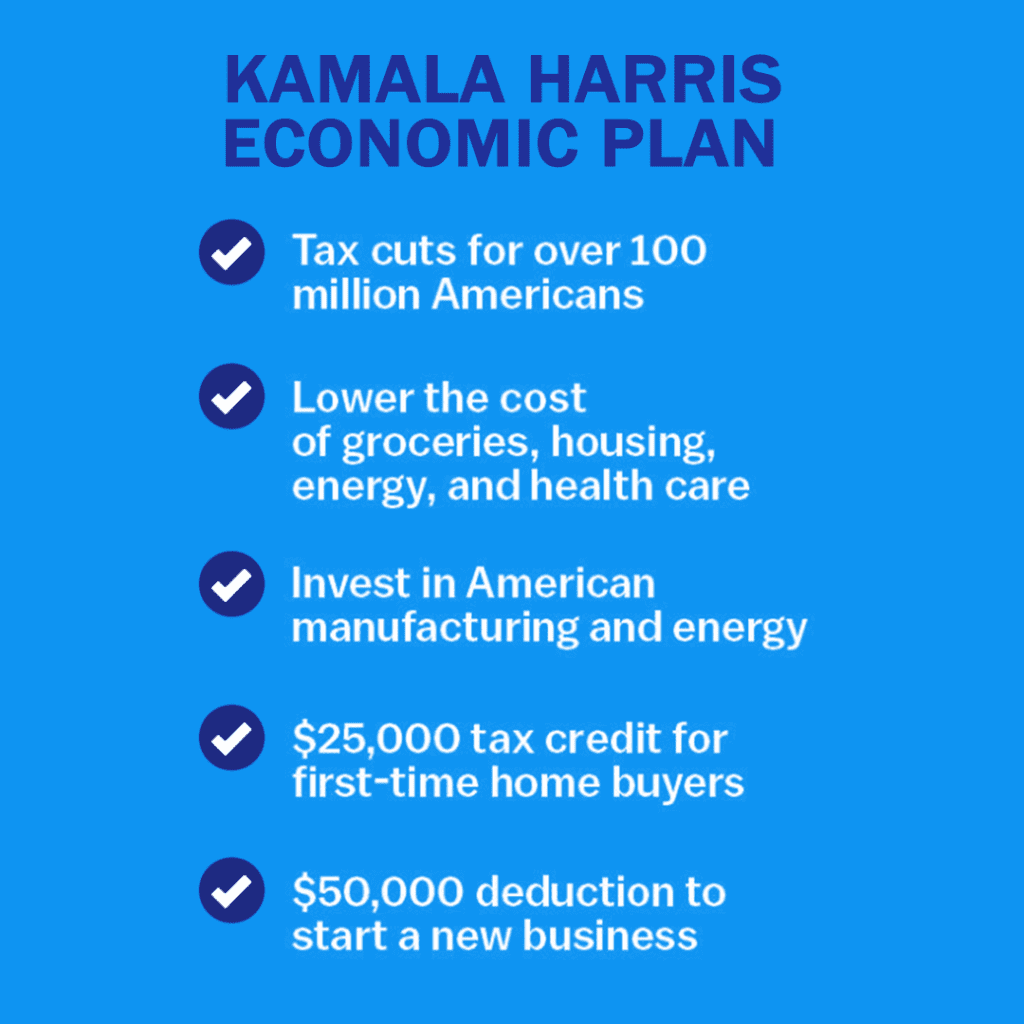
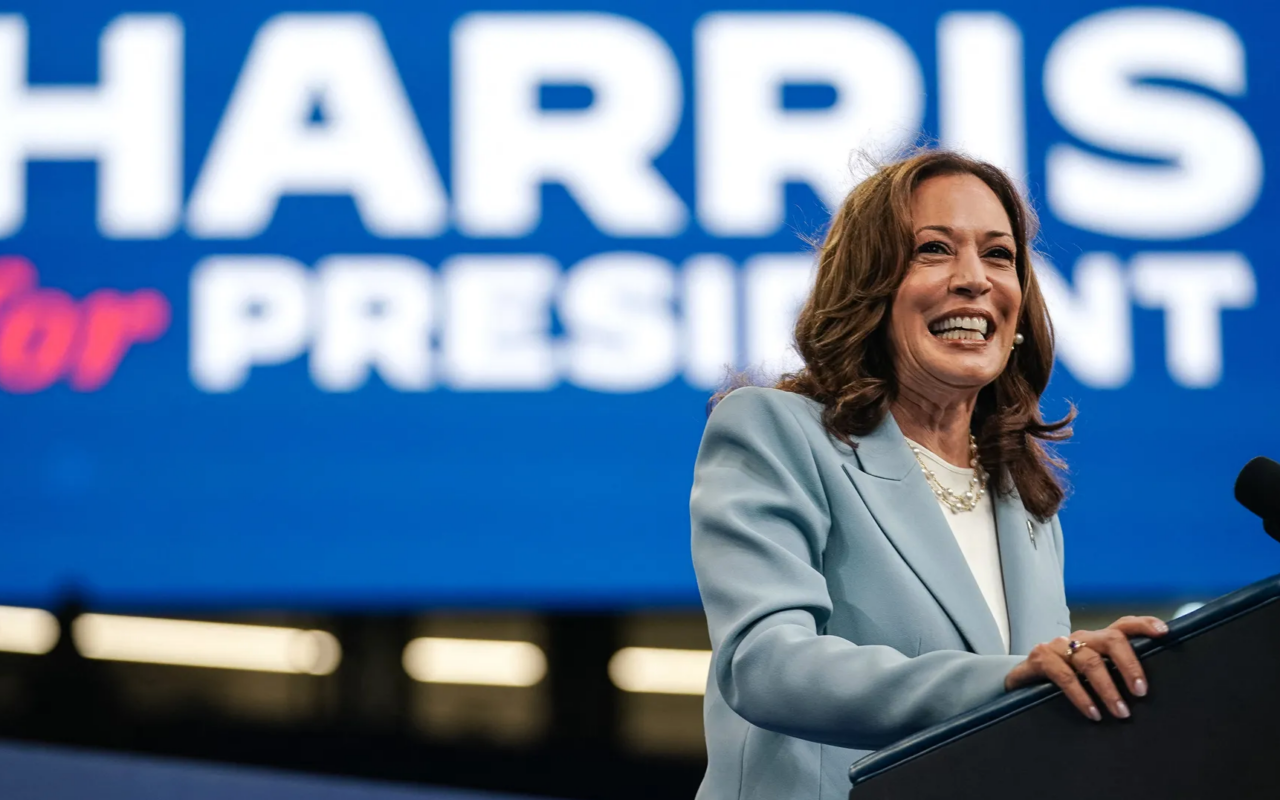
Comments are closed.